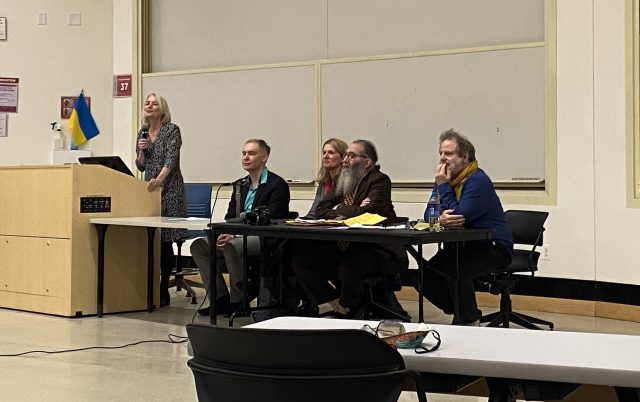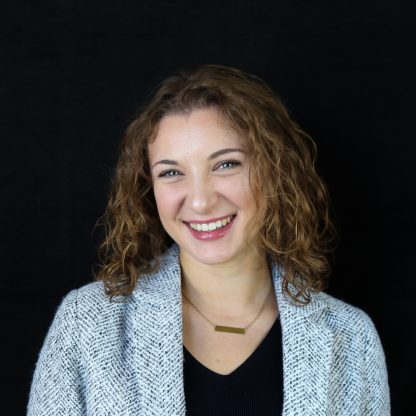
Alexander Orlov, Stony Brook professor of material science and chemical engineering, held his mother close in his heart as he participated in the Ukraine teach-in panel on March 23 at Frey Hall, thinking of the war waging outside of her front door in Ukraine.
“I am the type of person Putin is claiming he is protecting,” Orlov said, born in Ukraine with a Russian last name. “This protection by Putin is actually bombing my parents and relatives. From his perspective, people like me and my parents don’t deserve to live, do not deserve to have their homes and dreams, unless they are part of the Russian regime.”
Six other panelists representing Stony Brook University, the New York Times, the Sunday Times of London and PBS NewsHour participated in the panel on the Ukraine conflict that was open to students, faculty and the general public.
Sponsored by the Colvin Center for International Reporting at the School of Communication and Journalism, Sarah Baxter, Stony Brook journalism instructor and reporter for the Sunday Times, moderated the panel which featured correspondents actively reporting on the Ukrainian conflict.
With confusion and uncertainty surrounding the conflict and threats of misinformation being spread throughout eastern Europe — especially Russia — it is difficult to understand the realities of this ongoing war.
Described by both Baxter and Michael Slackman, international editor at the New York Times, as one of the most consequential conflicts of this lifetime, journalists play a key role in documenting the tragedy and history spanning out in the Russo-Ukrainian arena. The dangers they face while reporting come with working and living alongside the Ukrainian people.
Seven journalists have died in Ukraine since covering the violent conflict that began only a month ago, when Russia invaded on Feb. 24.
“We have all of our people working with security advisors who are focusing on logistics,” Slackman said. “The idea is when your head is down in your notebook or you’re looking through a viewfinder of a camera, that somebody is paying attention around you, somebody who has experience in military action.”
These security advisors act as the eyes and ears of journalists to ensure their safety while serving as the eyes and ears to the outside world, giving “voice to people who would otherwise be slaughtered in silence,” as Slackman said.
Louise Callaghan, reporter for the Sunday Times of London, is currently covering the conflict from Ukraine, and said that Ukrainians want international journalists reporting their stories.
One of the most difficult experiences she has witnessed people experience is “the feeling of your future disappearing, all plans that you had evaporating.” She says she watched people realize that in one moment, they had a home, family and career, and with the snap of a finger, it was all gone.
Orlov’s mother can now distinguish ballistic missiles from other forms of fire, as she hears them outside of her window. “Yesterday she told me that when the missile was flying near her kitchen, if it hits her house she would like to die quickly,” Orlov said.
The political climate in Russia is tense as well, as a propaganda war wages throughout the streets.
Harsh repression and censorship of media has made it increasingly difficult for reporters and civilians to share information about the war — simply using the words “war” or “invasion” can land people 15 years in prison under new laws.
“We could neither report the war accurately, report what was happening in Russia accurately, without the risk of a 15 year prison sentence,” Slackman said, explaining the removal of New York Times reporters from Russia.
A Russian woman was arrested for holding a sign that read “two words,” refraining from saying “no war,” yet still detained nonetheless.
Meanwhile on the American homefront, the public has generally not taken a great interest in the ongoing war, according to Leonie Huddy, Stony Brook political science professor and expert on public opinion. Huddy explained that the perceived lack of personal stake is enough for Americans to focus on the upcoming midterm elections instead of the Russo-Ukrainian war.
“When politicians look at what’s happening, they don’t see a huge appetite for extraordinary efforts on the part of the United States,” Huddy said.
Orlov said that this is his mother’s greatest fear. Not the missiles flying just outside her kitchen window, but being forgotten by the rest of the world.
“The biggest fear she has is to be forgotten by the West because at some point, you might get tired with images of human suffering and stop paying attention,” Orlov said. “Ukrainians are like you–they want freedom, they want to have free enterprise and they want to dream. Many of the Ukrainians who are fighting right now are the age of Stony Brook students, and they’ve never held a rifle in their lives.”











